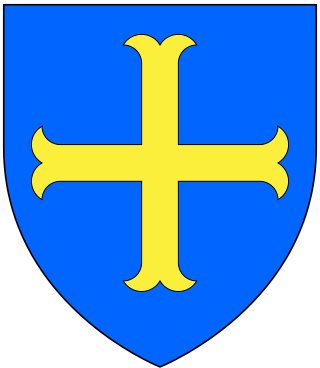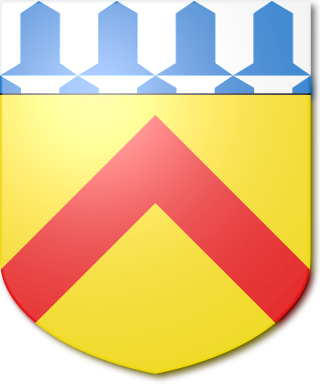
Viscount Cobham is a title in the Peerage of Great Britain that was created in 1718. Owing to its special remainder, the title has passed through several families. Since 1889, it has been held by members of the Lyttelton family.

There have been five baronetcies created for persons with the surname Barker, three in the Baronetage of England, one in the Baronetage of Great Britain and one in the Baronetage of the United Kingdom. All five creations are extinct.
There have been ten baronetcies created for persons with the surname Browne, six in the Baronetage of Great Britain, three in the Baronetage of Ireland and one in the Baronetage of Nova Scotia. Only one creation is extant as of 2010. Three of the creations were for members of the Browne family headed by the Viscount Montagu.

Viscount Hewett was a title in the Peerage of Ireland. It was created on 9 April 1689 for Sir George Hewett, 2nd Baronet. He was made Baron of Jamestown at the same time, also in the Peerage of Ireland. The Hewett Baronetcy, of Pishiobury in the County of Hertford, was created in the Baronetage of England on 19 July 1660 for Thomas Hewett, Member of Parliament for Windsor. Both titles became extinct on the first Viscount's death in 1689.
There have been four baronetcies created for persons with the surname Leslie, one in the Baronetage of Nova Scotia, one in the Baronetage of Ireland, one in the Baronetage of Great Britain and one in the Baronetage of the United Kingdom. Three of the creations are extant as of 2010.
Nineteen baronetcies have been created for persons with the surname Hamilton, eight in the Baronetage of Nova Scotia, one in the Baronetage of England, five in the Baronetage of Ireland, one in the Baronetage of Great Britain and four in the Baronetage of the United Kingdom. As of 2008 two creations are extant, two are dormant, two are either extinct or dormant and twelve extinct.

The Adams Baronetcy, of London, was a title in the Baronetage of England. It was created on 13 June 1660 for Thomas Adams, Lord Mayor of London in 1645. The title presumably became extinct on the death of the sixth baronet in 1770.
There have been four baronetcies created for persons with the surname Andrews, two in the Baronetage of England, one in the Baronetage of Great Britain and one in the Baronetage of the United Kingdom. All four creations are extinct.
There have been three baronetcies created for persons with the surname Bellingham, one in the Baronetage of England, one in the Baronetage of Ireland and one in the Baronetage of Great Britain. As of 2014 one creation is extant.
There have been six baronetcies created for persons with the surname Brooke, one in the Baronetage of England, one in the Baronetage of Ireland and four in the Baronetage of the United Kingdom. As of 2015 four of the creations are extant, though one has been subsumed into a peerage.
There have been four baronetcies created for persons with the surname Holland, one in the Baronetage of England and three in the Baronetage of the United Kingdom.
There have been four baronetcies created for persons with the surname Temple, two in the Baronetage of England, one in the Baronetage of Nova Scotia and one in the Baronetage of the United Kingdom.
Three baronetcies were created for persons with the surname D'Oyly, two in the Baronetage of England and one in the Baronetage of the United Kingdom. One creation is extant as of 2008.

There have been two baronetcies created for persons with the surname Yelverton, both in the Baronetage of England.

There have been three baronetcies created for descendants of the ancient Norman family of Molyneux who were granted extensive estates in Lancashire after the Norman Conquest.

There have been three baronetcies created for members of the Sedley family of Kent, all in the Baronetage of England. All three creations are extinct.

There have been four baronetcies created for persons with the surname Cope.

The St Quintin Baronetcy, of Harpham in the County of York, was a title in the baronetage of England. It was created on 8 March 1642 for William St Quintin. The third Baronet sat as Member of Parliament for Kingston upon Hull. The fourth Baronet was Member of Parliament for Thirsk. The title became extinct on the death of the fifth Baronet in 1795. The family estate of Scampston Hall was passed on to the late Baronet's nephew, William Thomas Darby, the son of Vice-Admiral George Darby, who assumed the surname and arms of St Quintin.
There have been three baronetcies created for persons with the surname Duncan, one in the Baronetage of Great Britain and two in the Baronetage of the United Kingdom. All three creations are extinct.
There have been three baronetcies created for persons with the surname Humble, two in the Baronetage of England and one in the Baronetage of the United Kingdom. All are extinct.









